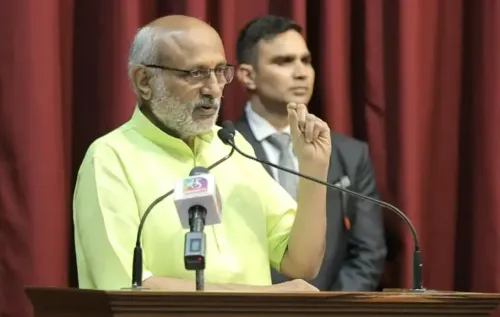Is the Indian Workforce Battling Chronic Illness and Burnout?

Synopsis
Key Takeaways
- Chronic illnesses begin affecting workers as early as age 40.
- 40% of employees take sick days for mental health issues.
- Companies lose up to 30 days of productivity per employee annually due to chronic diseases.
- Men dominate healthcare utilization in the 30-49 age group.
- Women often delay seeking treatment, leading to severe health conditions.
Bengaluru, May 29 (NationPress) A significant health crisis is emerging in corporate India, with a substantial portion of the workforce grappling with chronic illnesses, mental health issues, and burnout, as highlighted in a troubling report released on Thursday.
The report from Plum, a prominent employee health benefits platform in India, indicates that chronic health issues begin impacting working professionals as early as age 40. Alarmingly, it found that 40 percent of employees take at least one sick day monthly due to mental health challenges, and 1 in 5 are contemplating resignation because of burnout.
The findings reveal concerning trends in the early onset of major health conditions: heart disease by age 32, cancer by age 33, diabetes by age 34, chronic kidney disease by age 35, and cerebrovascular diseases (including strokes and ischemia) by age 36.
This early emergence of health issues not only jeopardizes individual well-being but also exerts long-term strain on productivity, healthcare expenses, and the economic vitality of India.
Chronic illnesses can lead to productivity losses of up to 30 days per employee annually.
The report urges Indian companies to redefine what they consider value in employee benefits, emphasizing the importance of prevention, holistic care, and catering to the specific needs of their workforce.
“It’s essential for companies to rethink healthcare beyond the mere transactional nature of insurance. Genuine employee well-being is rooted in delivering comprehensive healthcare solutions that address mental, physical, and social health,” stated Abhishek Poddar, Co-founder of Plum.
“Our report highlights the urgent need for a holistic strategy that enables employees to manage their health journeys, particularly by acknowledging the unique mental health requirements of diverse workforce demographics,” he added.
Despite the burgeoning health challenges, only 20 percent of companies provide regular health assessments, and even then, just 38 percent of employees take advantage of these services.
Mental health issues are rapidly escalating, with anxiety being the predominant concern.
The data also uncovers a gender disparity in access and stigma, with men utilizing healthcare services (58 percent) more frequently in the 30-49 age bracket. Conversely, women aged 50-59 represent 68 percent of benefit usage, largely due to the typical onset of menopause and perimenopause, combined with years of neglecting their health due to caregiving responsibilities, which often leads to late detection of serious conditions and necessitates treatment.









